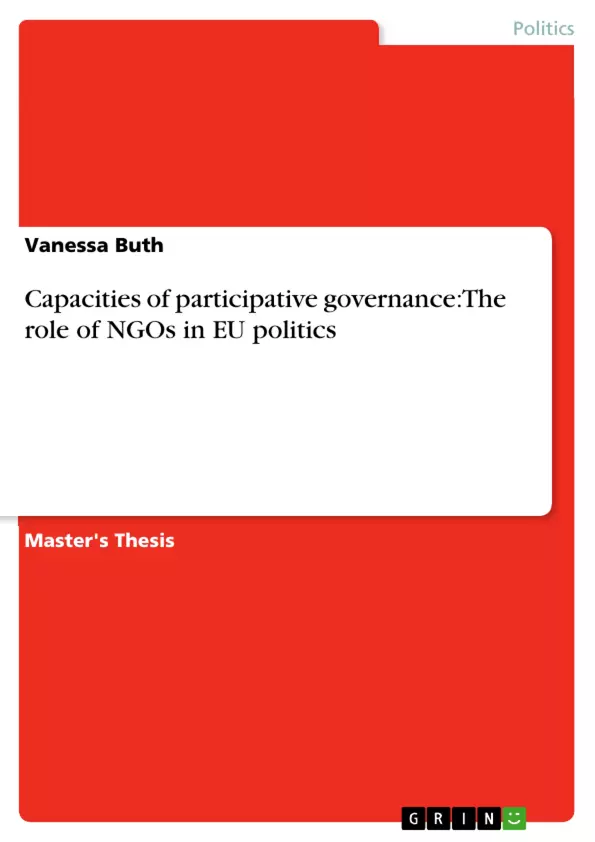In the move of the ‘Europeanisation’, the deepening and widening of the European Union, the system of European governance is becoming ever more complex. The increase from 15 to 25 Member States and the needs of cooperation amongst the different levels of the European Union (EU) - European, national, regional and local level – are posing a challenge to democracy. The lack of democratic legitimacy of today’s traditional system requires alternative ways of governing which are already developing. A solution to the question of legitimacy and structure is the deliberative democracy theory of John Dryzek. In this context Non-Governmental Organizations (NGOs), as representatives of civil society, are playing an important role and the EU promotes the cooperation with this sector. However, cooperation is concentrated on NGO umbrella organizations on the EU level. It is argued, that the socio-political strategy of the EU undermines the idea of deliberative democracy and in particular the function of NGOs. Through privileging selected, international networks the latter risk loosing their autonomy. Smaller and local NGOs tend to be left out, even though it is especially those that have close contact with the citizenry and the practical knowledge to develop strategies for solutions. Consequently, new socio-political structures need to aim at involving a wide range of NGOs of all sizes and levels into EU politics as partners next to international networks. EU politics need to become more flexible so that established traditions do not hazard the genuine representation and involvement of civil society in a deliberative sense and thus democratic legitimacy.
Inhaltsverzeichnis (Table of Contents)
- Introduction
- Democratic deficit and crisis of legitimacy
- Deliberative democracy and the regeneration of legitimacy
- The role of NGOs from a deliberative perspective
- The scientific point of view
- The global dimension
- The European dimension
- The national dimension
- The Non-Governmental point of view
- Resume of hopes and expectations towards NGOs
- Framework conditions for EU-NGO cooperation
- Legal and institutional framework
- Principles and regulations
- Consultation by policy areas
- Approaches towards trans-sectoral and multileveled influence
- Problems and limitations
- Financial framework
- Sources of EU Funding
- Grant giving criteria
- Resulting disparities and concerns
- Legal and institutional framework
- Berlin case studies
- Online deliberation by 'poldi.net'
- Make deliberation be politics - Politikfabrik
- Towards a genuinely participative governance
- A reform for civil dialogue
- Equal and inclusive involvement
Zielsetzung und Themenschwerpunkte (Objectives and Key Themes)
This paper explores the challenges of democratic legitimacy within the increasingly complex system of European governance, focusing on the role of Non-Governmental Organizations (NGOs) in fostering deliberative democracy. It aims to examine the potential and limitations of EU-NGO cooperation, taking into account the legal, institutional, and financial frameworks involved. Through a case study approach, the paper analyzes practical experiences with EU-NGO cooperation and outlines suggestions for a reform of the European socio-political structure to facilitate genuine participatory democracy.
- Democratic deficit in European governance
- Deliberative democracy as a solution
- The role of NGOs in promoting deliberative democracy
- Framework conditions for EU-NGO cooperation
- Suggestions for a reform of the European socio-political structure
Zusammenfassung der Kapitel (Chapter Summaries)
The first chapter establishes the problem of democratic deficit within the complex transnational European system, highlighting the increasing distance between EU decision-making and citizen involvement. Chapter two presents deliberative democracy theory as a potential solution, emphasizing the need for inclusive and meaningful participation in political processes. Chapter three explores the hopes and expectations held towards NGOs as representatives of civil society, arguing that they play a crucial role in fostering deliberation and legitimacy. Chapter four provides an insight into the European legal and institutional framework governing EU-NGO cooperation, analyzing its strengths and weaknesses. The fifth chapter examines case studies of NGO activities in Berlin, demonstrating the practical experiences with EU cooperation and support from a deliberative perspective. Chapter six, based on the findings of the previous chapters, elaborates suggestions for a reform of the European socio-political structure, enabling NGOs to fulfil their function and facilitating genuine participatory democracy. The paper concludes with an outlook into the future of European governance and the potential for integrating all citizens in a more participatory system.
Schlüsselwörter (Keywords)
The key concepts explored in this paper include democratic deficit, deliberative democracy, EU-NGO cooperation, participatory governance, civil society, legitimacy, socio-political structures, and case studies.
Frequently Asked Questions
What is the "democratic deficit" in the European Union?
It refers to the perceived lack of democratic legitimacy and the distance between EU decision-making processes and the actual involvement of European citizens.
How can deliberative democracy solve the EU's legitimacy crisis?
According to John Dryzek's theory, deliberative democracy emphasizes meaningful and inclusive participation, where decisions are made through public reasoning rather than just voting.
What role do NGOs play in European politics?
NGOs act as representatives of civil society, providing practical knowledge and acting as a bridge between the citizenry and EU institutions to foster legitimacy.
Why is the focus on NGO umbrella organizations criticized?
Privileging large international networks risks losing the autonomy of the NGO sector and often excludes smaller, local NGOs that have closer contact with citizens.
What are the financial challenges for NGOs working with the EU?
The paper discusses how grant-giving criteria and funding sources can create disparities and influence the independence of non-governmental organizations.
- Quote paper
- Diplom-Kauffrau, MA Contemporary European Studies Vanessa Buth (Author), 2006, Capacities of participative governance: The role of NGOs in EU politics , Munich, GRIN Verlag, https://www.grin.com/document/65495



